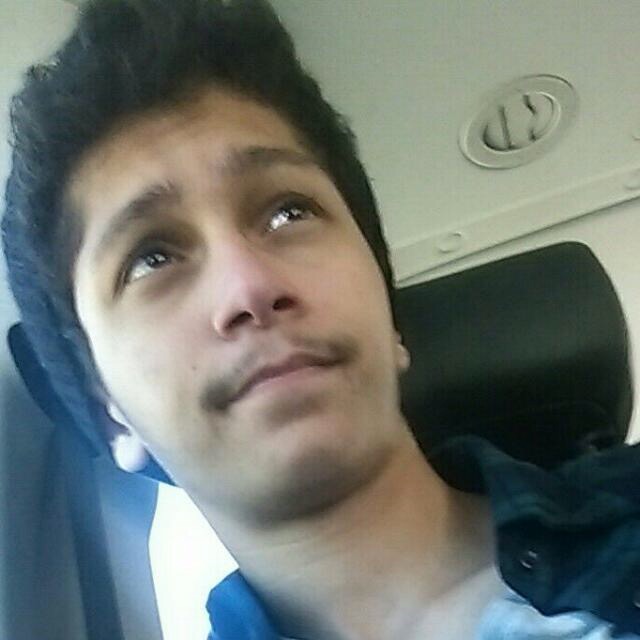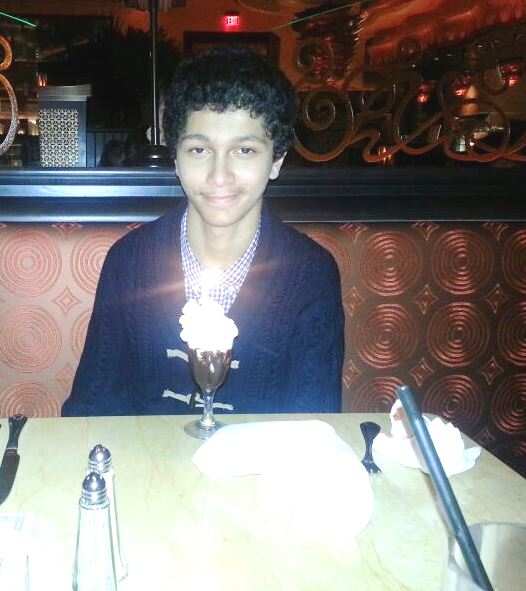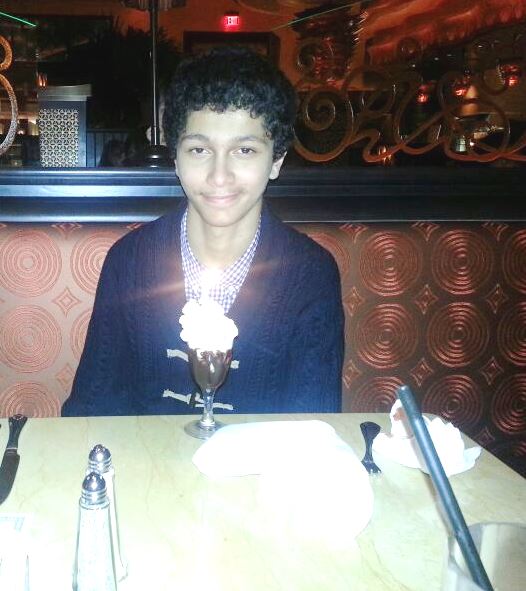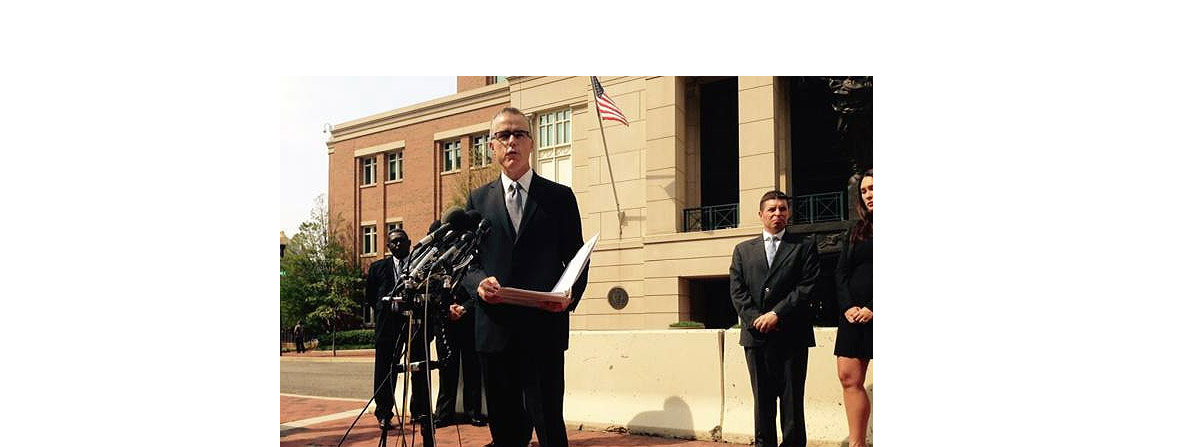



WASHINGTON — “All rise,” said the bailiff as Judge Claude M. Hilton entered his courtroom in Alexandria, Virginia on a late August morning. Seventeen-year-old Ali Shukri Amin was being sentenced for providing material support to a terror organization.
Everyone, including Amin and more than two dozen family and friends rose, except his biological father.
Shukri Abdelirahim, who flew in from the United Arab Emirates for the procedure in late August, remained seated. He seemed to be lost in his thoughts, staring at his son. A U.S. marshal on duty in the courtroom walked over, tapped him on the shoulder and motioned for him to rise. He did.
Disobeying the bailiff seemed odd since Abdelirahim is a lawyer in the UAE. But his behavior was, in part, explained by a letter he wrote to Hilton pleading for leniency for his son—whom he had not seen in 13 years.
In the letter Abdelirahim wrote, “My son was born in Sudan and taken to America without my knowledge and consent and his mother has kept him hidden from me since he was four.”
Abdelirahim wrote that his absence “created a spiritual wound” in his son. He said not being there to influence his early life led to Amin’s “misery and depression” and “reflected his desperate suicidal thoughts and falling prey to the evil that exists on the Internet.”
But Abdelirahim took responsibility for not being a part of his son’s life, suggesting it left his son open to radicalization.
“It is so clear to me that the absence of a father in his life and the conflict that he had with his mother contributed to Ali trying to prove to his mother or himself that he is a strong man who can be decisive and wage war, ” Abdelirahim wrote in the letter.
ISIL filled a void
The Islamic State was the vehicle Amin allegedly tried to use to fill the emptiness in his life.
He admitted to using Twitter to provide advice and encouragement to ISIL and its supporters. “Amin used the Twitter handle @Amreekiwitness, to provide instruction on how to use Bitcoin, a virtual currency, to mask the provision of funds to ISIL, as well as facilitation to ISIL supporters seeking to travel to Syria to fight with ISIL,” the U.S. Department of Justice said in a statement.
Additionally, Amin admitted that he facilitated travel for Reza Niknejad, an 18-year-old Prince William County, Virginia resident who traveled to Syria to join ISIL in January.
“He wasn’t born a terrorist. He was radicalized at some point,” Amin’s attorney Joseph Flood told WTOP.
Flood said that in order to understand Amin’s situation, it’s important to realize that in 2014 he didn’t take on the persona of @Amreekiwitness on Twitter overnight. “There were things that happened a year and a half before that. A process was set in place,” says Flood. Amin, a former honor student at Manassas High School, told Flood he was 15 years old when he was caught in the Web of online radicals.
Amin amassed more than 4,000 followers and sent more than 7,000 tweets. Using the account, he engaged in an open argument with the State Department’s@ThinkAgain_DOS twitter account over what officials referred to as killing of innocent people by Osama bin Laden and his followers.
Amin wrote:
“Slaughter innocents? You mean like AbdurRahman al-Awlaki, the 16 year old boy not involved with any militants? Or what about the thousands killed in drone strikes weekly that make the news? The thousands that don’t? You are nothing more than criminals who betray the Muslims you claim to defend across the globe, butchering them 1.7 million in Iraq, hundreds of thousands in Afghanistan, left, right, everywhere. Only an ignoramus who knows nothing about American foreign policy or any Muslim country could accept your lies. Which is why the American school system is so poor, eh? Gotta’ keep them stupid to keep them in line!”
In the past year, dozens of teenagers around the world, like Amin, have been arrested on terrorism charges. “ISIL and its supporters’ innovative use of social media and messaging has played a key role in motivating young Western males and females to travel to the Syrian conflict to join and support the self-declared Islamic State,” the FBI and Department of Homeland Security said in a February joint intelligence bulletin.
The bulletin said: “Several recent instances demonstrate some youth are vulnerable to messaging from ISIL and its supporters that purports to offer them a cause to join or support, and depicts Syria and Iraq as desirable places to live. These incidents show that some Western youth are willing to connect over social media with like-minded persons, and have proven adept at obfuscating such social media usage from their parents and guardians.”
That appeared to be precisely what Amin did, falling victim to shadowy jihadist figures that lurk in the recess of the Internet and prey upon the mentally vulnerable.
One such figure was Junaid Hussain. He was killed in a U.S. drone strike on Aug. 28. It’s not believed that Hussein connected with Amin, but there is anecdotal evidence he did with other Americans.
In a statement, the Counter Extremism Project described Hussein as “a British computer hacker and fugitive, [who] was arguably the most important and highest profile English speaking online recruiter and propagandist for the Islamic State in Iraq and Syria (ISIS).”
Hussain reportedly radicalized and directly encouraged Elton Simpson to carry out the May 3 attack with Nadir Soofi on a draw-Muhammad contest in Garland, Texas.
The “dopamine” appeal
U.S. intelligence officials believe there are many like Hussein on the Internet looking for young, malleable people to draw into their operations using, slick publications, popular culture references, and music.
The recruiting campaign is design to appeal to the impulsive nature of teenagers. Flood called it the “dopamine” appeal.
“Part of dopamine is reinforcing powerfully those stimuli that give you pleasure, satisfaction, gratification and in this case identity,” says Flood.
It appears Amin found his identity in ISIL’s efforts to build a so-called Caliphate.
According to court documents, Amin was born with a physical condition called syndactyly, a condition in which the middle fingers of his left hand were fused together. He needed a series of surgical procedures in the first years of his life to separate and reconstruct his left hand.
As he entered elementary school, the documents say, he developed Crohn’s disease, a chronic inflammatory bowel disease that affects the lining of the digestive tract. Amin was frequently absent from school until he had a surgical procedure at age 14. His symptoms led his mother to prevent him from socializing widely until he was a teenager, which may have impacted his self-esteem and ability to connect with other children.
Flood contends that the developments made Amin a perfect target for terrorist recruiters lying in wait. “Sitting down at the computer and getting immediate reinforcement from people overseas, who are older, who are representing themselves as being connected as important, telling you that you’re are important, when maybe you are struggling with that is a very, very powerful reinforcement,” he said.
The confluence of his childhood hardships, the aggressive recruitment ISIL operatives and the newfound sense of importance led Amin into a spiral of events that ended on Jan. 14. According to court documents, after dropping off Niknejad at Dulles Airport, Amin and another individual described as a co-conspirator delivered a letter and a USB drive to Niknejad’s family indicating that he did not plan to see them again. Federal authorities say they have evidence that he did arrive in Syria and hasn’t been heard from since.
WTOP obtained several photographs of Amin shortly before he was arrested on Feb. 27. One of the photos was an image of him doing something any other teenager might do—taking a selfie.
Coming of age in prison
Amin stood before the judge one month shy of his 18th birthday in a dark prison jumpsuit and was sentenced to 11 years at the Federal Correctional Complex Butner in North Carolina.
It’s home to hardened criminals such as Cali cartel founder Gilberto Rodriguez Orejuela, Nicodemo Scarfo, former Boss for the Philadelphia crime family, Carmine Persico and former Colombo crime boss. Others such as convicted spy Jonathan Pollard, and renowned swindler Bernard Madoff reside there, as well.
In his letter to the judge Ali’s father sought to separate his son from the likes of career criminals, terrorists and spies. He wrote: “even though, I have not been in present in his life these last 13 years, I can see that he is a good boy and has a good heart. Since Ali’s arrest, we have reconnected and developed a strong relationship and I speak to him on the phone and I hope to visit him when I come to the United States for his sentencing.”
Because of Crohn’s disease, Abdelirahim said, “Ali is thin, physically weak and vulnerable, and I worry that going to an adult prison will destroy him and prevent him from overcoming his mistakes.”
After the sentencing, during which Amin apologized and took responsibility for his actions, he and his father met in the courthouse jail, face to face for the first time since Amin was 4 years old.








